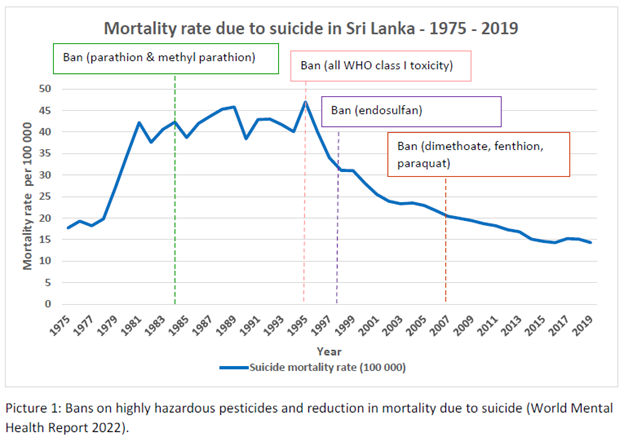The World Suicide Prevention Day (WSPD) has been commemorated globally on 10 September of every year since 2003. It is an annual awareness raising event organized by the International Association for Suicide Prevention (IASP) together with WHO. This day focuses attention on reducing stigma around suicide and raises awareness among organizations, government, and the public, giving a singular message that suicide can be prevented.
“Creating hope through action” is the triennial theme for the World Suicide Prevention Day from 2021 to 2023. By creating hope through action, it is signaled to people experiencing suicidal thoughts that there is hope, and other people care and want to support them. It also suggests that everyone’s actions, no matter how big or small, may provide hope to those who are struggling. Globally over 703 000 precious lives are lost to suicide every year, which equates to one life every 40 seconds. To put this in perspective, by the time we finish reading this today, we would have lost at least 4 to 5 people somewhere around the world, not due to conflict or disasters but due to suicide. Every life lost represents someone’s partner, child, parent, friend or colleague, but the impact of death due to suicide reaches far beyond the lives lost. For every suicide, there are likely 20 other people making a suicide attempt and many more have serious thoughts of suicide. Millions of people suffer intense grief or are otherwise profoundly impacted by suicidal behaviours.
Sri Lanka is a unique yet an inspirational case for suicide prevention. In 1994 and 1995, with 7 717 and 8 514 reported suicides, Sri Lanka was a country with one of the highest suicide mortality rates. In 1994, a Presidential Commission was established to draft a national policy and action plan on suicide prevention, and to coordinate actions across multiple government agencies and other relevant partners. Such alarming statistics provoked the government to introduce laws prohibiting the import of highly toxic WHO class 1 pesticides in 1995 and 1998. This directly coincided with a reduction in suicide mortality rates between 1995 (n=8514; 48 per 100 000 ) to 2019 (n=3135; 14.3 per 100 000). While the number of suicide deaths reduced from 8 514 to 3 135, significant challenges still remain. The suicide mortality rate in Sri Lanka was the highest one in SEAR region in 2019. The number of hospital admissions due to self-poisoning also increased from 69 181 in 2009 to 81 292 in 2019.

WHO Sri Lanka supported the Ministry of Health to develop the Suicide Prevention Strategy and Suicide Prevention Action Plan. The main objectives of the suicide prevention strategy are: 1) Coordinate and strengthen the collaboration with relevant stakeholders in preventing suicides; 2) Support and strengthen the policies, guidelines and regulatory measures for preventing suicides in the community; 3) Facilitate the provision of accessible, affordable, socially and culturally acceptable mental health services; 4)Promotion of psychosocial wellbeing in the community; 5) Improve the environment of Institutes of learning (Schools, Institutes of higher education, Vocational training Institutes and Universities) to provide better mental health for both teachers, lecturers and students and 6) Establish an efficient surveillance system, strengthen information systems, evidence and research.
Further, WHO supported the Ministry of Health to leverage digital technologies by training district health care staff on telephone (1926) counselling to support the callers. The way we communicate about, and report suicide is of utmost importance. In this regard, WHO Sri Lanka will collaborate with Sri Lanka Press Institute to train media reporters and journalists on ethical and responsible reporting.
In response to the emerging issues at the community level due to socio-economic crisis and the compounding impacts of the pandemic, MOH together with Civil Society Organizations and WHO’s technical assistance, implements a Community-Based Mental Health and Psychosocial Support (MHPSS) programme named ‘Manohari’. The programme is a non-expert driven intervention that is designed to build community capacity to cope and build resilience through the use of culturally-sensitive techniques such as storytelling. Manohari provides a platform and a safe space for community members to share the challenges they face and discuss collective actions towards improving communal wellbeing. This is one of skill building programmes to train coping skills to face the challenges.
All people can play a role in supporting those experiencing a suicidal crisis or those bereaved by suicide whether as a member of society, as a child, as a parent, as a friend, as a colleague or as a person with lived experience. It is important to reach out to people who are struggling and create hope through action to prevent suicides.
Key resources
World Suicide Prevention Day campaign page: https://www.who.int/campaigns/world-suicide-prevention-day/2022#:~:text=%E2%80%9CCreating%20hope%20Through%20Action%E2%80%9D
Read more on Suicide Prevention: https://www.who.int/health-topics/suicide#tab=tab_1
World Mental Health Report: https://www.who.int/teams/mental-health-and-substance-use/world-mental-health-report
